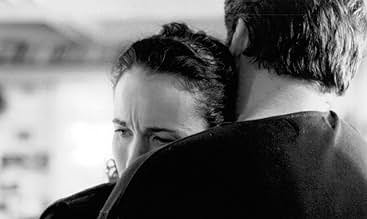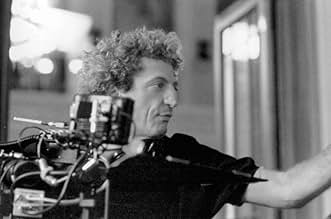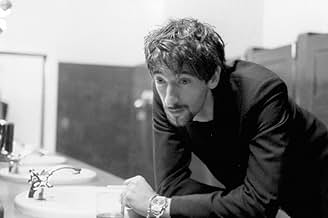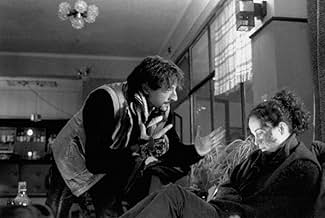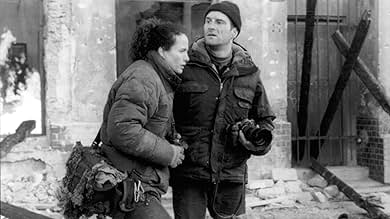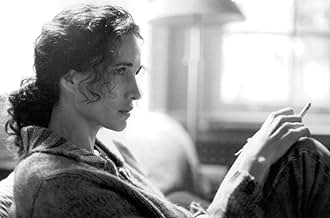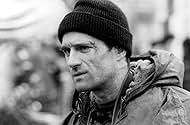IMDb-BEWERTUNG
7,0/10
6981
IHRE BEWERTUNG
Als ein Newsweek-Fotojournalist im kriegsgebeutelten Jugoslawien verschwindet, reist seine Frau nach Europa, um ihn zu finden.Als ein Newsweek-Fotojournalist im kriegsgebeutelten Jugoslawien verschwindet, reist seine Frau nach Europa, um ihn zu finden.Als ein Newsweek-Fotojournalist im kriegsgebeutelten Jugoslawien verschwindet, reist seine Frau nach Europa, um ihn zu finden.
- Auszeichnungen
- 3 Gewinne & 1 Nominierung insgesamt
Scott Anton
- Cesar Lloyd
- (as Scott Michael Anton)
Empfohlene Bewertungen
Thank goodness for Brendan Gleeson and Adrien Brody. Without their performances, this movie would have been a waste of time. I couldn't stand Andie MacDowell's character. She plays a totally stupid woman. Anyone with any sense would have contacted the Red Cross and other international agencies and asked them to look for her husband, but she foolishly marches into the middle of a civil war and risks the lives of her husband's colleagues because she is so deeply in love. Of course, it would have been a different movie if her character acted with any brains and maturity. At a time when her children needed her the most, she leaves them and almost gets killed herself. The audience is supposed to think this is wonderful because it is so romantic. Give me a break.
I just saw "Welcome to Sarajevo", a film that got a lot of press and positive remarks when it came out. I only suspect that much of the press was based on the fact that it came out only a couple of years after the end of that terrible war in Bosnia.
Just as in "Welcome" this film also depicts the life of journalists, trying to understand and convey the happenings in a country once believed to be almost western. (Which, I suspect, is the reason that it had such an impact on the western psyche.) As everbody else has pointed out this is where the best characters are found, especially Adrian Brodys character.
Several others have already pointed out that the main story revolving around a lost love and an heroic wife trying to save her husband is really awkward. But since you need somekind of story, that might just as well be it. I saw this film a second time just recently and actually managed to ignore the plot and focuse on the description of the madness that was eastern Croatia in the early 1990´s.
This film has an incredible feeling, the settings, the photography and the score makes it come really close to being in an actual war. I cant really praise this enough. Compared to "Welcome" this film hits you in the guts as it shows the brutality of urban warfare and the senseless killings that occur in all wars.
Other films about Bosnia that are recommended if you like this one, "No mans land", "Pretty Village, Pretty fire" and "Savior". And why not give "Welcome" a chance too.
Just as in "Welcome" this film also depicts the life of journalists, trying to understand and convey the happenings in a country once believed to be almost western. (Which, I suspect, is the reason that it had such an impact on the western psyche.) As everbody else has pointed out this is where the best characters are found, especially Adrian Brodys character.
Several others have already pointed out that the main story revolving around a lost love and an heroic wife trying to save her husband is really awkward. But since you need somekind of story, that might just as well be it. I saw this film a second time just recently and actually managed to ignore the plot and focuse on the description of the madness that was eastern Croatia in the early 1990´s.
This film has an incredible feeling, the settings, the photography and the score makes it come really close to being in an actual war. I cant really praise this enough. Compared to "Welcome" this film hits you in the guts as it shows the brutality of urban warfare and the senseless killings that occur in all wars.
Other films about Bosnia that are recommended if you like this one, "No mans land", "Pretty Village, Pretty fire" and "Savior". And why not give "Welcome" a chance too.
This movie is simply made for watching on video or DVD. Here's the plan--the first time through, watch all of it. But on subsequent viewings, just watch the stuff that happens in Yugoslavia.
Except for the men's room scene after the Awards Banquet.
This movie is really, really frustrating to watch because you can't help but feel that the directors and other creative parties associated with the actual film were very dedicated to telling the story of the journalists and photographers who were trying to bring the truth of what was happening in the early days of the ethnic cleansing in the former Yugoslavia to the screen. They were fascinated by the people who would willingly risk their lives to obtain images of the horrors and atrocities being carried out to the rest of the world, and what motivated them--made them tick. And they were enamoured of the character of Kyle Morris, as portrayed by Adrien Brody, and wished to showcase him in some way in order to drive the point home--that people like him were brave and admirable, no matter what their personal demons and failings.
Unfortunately for those of us who were hooked on this POV, they were also hamstrung, utterly, by the source material, which was a love story about a woman who would not believe her husband was dead, and whose dedication to finding him and whose devotion to him was convincing enough to cause persons such as are described in the preceding paragraph to risk life and limb to try to reunite this couple.
I don't want to use this space to snark. It's unseemly, given the seriousness of the subject matter. What I want to highlight is the way in which one of the performances affected me. The central figure of this movie from a standpoint of character arc is not Harrison, or his wife, Sarah, but Kyle Morris. We first see Kyle at a Pulitzer Awards dinner, where a grief-stricken, coke-addled Kyle Morris goes off on the Harrison Lloyd character. It's a show-stopper, and drenches everything else that happens in Yugoslavia with layers and layers of bitter irony.
The great stuff in this is movie is all about Adrien Brody's character Kyle Morris. This is probably the sort of character that a young actor just dreams of getting his teeth into. Kyle is one of those bundles of contradictions and contrasts that fascinates endlessly. He is an angry, foul-mouthed swaggerer with the gentle hands and soul of a poet, and a kind heart too easily touched. He is a drug user, which is usually portrayed as a character defect which goes along with being weak or afraid to face reality, but in his case, it is probably more a result of his trying to cope with having too MUCH courage and desire to walk into the bowels of real-life hells, like war-torn Yugoslavia. He is both cocksure and certain, and insecure, terrified he will never get recognized for what he is doing in trying to record the truth. He takes rebellious pride in being an outsider, but he churns with jealous resentment against those who seem to have "made it". This character is BRAVE, quick, resourceful, clever, with a crackling energy that suffuses every line, every expression, every move he makes. Brody brings a wild animal's instinctive quickness and 360 degree awareness of the environment to the role; you can almost see his large but sensitive nostrils quiver as he tests the wind for the scent of danger, and the way to safety. If I were going deep into the heart of the battle zone with nothing more than a camera bag and a sense of purpose, I would want no one else to take me there. When he wraps his arm around Sarah, and tells her to move, she obeys. I would, too. He seems to be tapped in to the undercurrents that flow beneath the reality that they see and hear around them, and sense shifts in the flow and direction that the others cannot, and acts on a combination of instinct and intelligence to get Sarah into a city which has become a charnel house where no badge or profession is respected or spared from the snipers and the bayonets.
I was fascinated by this character. It was the sort of portrayal that made one want to know more--what drives someone like that? What was his childhood like? Why did he risk all for someone like Sarah?
Unfortunately, this portrayal and character threw the whole film off-balance, and made the putative heroine seem self-absorbed and unlikable in the end.
I recommend this movie for the brilliant footage of the journalists and Sarah working their way through war-torn Yugoslavia, for the harrowing urban combat scenes, and for Brody's performance.
I can't, however, give it more than 8 stars, since it committed the primary infraction of rendering its heroine unlikable in certain ways, without redemption or the change brought about by a true character arc.
Also, Harrison and Sarah's son was sort of creepy. Sorry, but there it is.
Except for the men's room scene after the Awards Banquet.
This movie is really, really frustrating to watch because you can't help but feel that the directors and other creative parties associated with the actual film were very dedicated to telling the story of the journalists and photographers who were trying to bring the truth of what was happening in the early days of the ethnic cleansing in the former Yugoslavia to the screen. They were fascinated by the people who would willingly risk their lives to obtain images of the horrors and atrocities being carried out to the rest of the world, and what motivated them--made them tick. And they were enamoured of the character of Kyle Morris, as portrayed by Adrien Brody, and wished to showcase him in some way in order to drive the point home--that people like him were brave and admirable, no matter what their personal demons and failings.
Unfortunately for those of us who were hooked on this POV, they were also hamstrung, utterly, by the source material, which was a love story about a woman who would not believe her husband was dead, and whose dedication to finding him and whose devotion to him was convincing enough to cause persons such as are described in the preceding paragraph to risk life and limb to try to reunite this couple.
I don't want to use this space to snark. It's unseemly, given the seriousness of the subject matter. What I want to highlight is the way in which one of the performances affected me. The central figure of this movie from a standpoint of character arc is not Harrison, or his wife, Sarah, but Kyle Morris. We first see Kyle at a Pulitzer Awards dinner, where a grief-stricken, coke-addled Kyle Morris goes off on the Harrison Lloyd character. It's a show-stopper, and drenches everything else that happens in Yugoslavia with layers and layers of bitter irony.
The great stuff in this is movie is all about Adrien Brody's character Kyle Morris. This is probably the sort of character that a young actor just dreams of getting his teeth into. Kyle is one of those bundles of contradictions and contrasts that fascinates endlessly. He is an angry, foul-mouthed swaggerer with the gentle hands and soul of a poet, and a kind heart too easily touched. He is a drug user, which is usually portrayed as a character defect which goes along with being weak or afraid to face reality, but in his case, it is probably more a result of his trying to cope with having too MUCH courage and desire to walk into the bowels of real-life hells, like war-torn Yugoslavia. He is both cocksure and certain, and insecure, terrified he will never get recognized for what he is doing in trying to record the truth. He takes rebellious pride in being an outsider, but he churns with jealous resentment against those who seem to have "made it". This character is BRAVE, quick, resourceful, clever, with a crackling energy that suffuses every line, every expression, every move he makes. Brody brings a wild animal's instinctive quickness and 360 degree awareness of the environment to the role; you can almost see his large but sensitive nostrils quiver as he tests the wind for the scent of danger, and the way to safety. If I were going deep into the heart of the battle zone with nothing more than a camera bag and a sense of purpose, I would want no one else to take me there. When he wraps his arm around Sarah, and tells her to move, she obeys. I would, too. He seems to be tapped in to the undercurrents that flow beneath the reality that they see and hear around them, and sense shifts in the flow and direction that the others cannot, and acts on a combination of instinct and intelligence to get Sarah into a city which has become a charnel house where no badge or profession is respected or spared from the snipers and the bayonets.
I was fascinated by this character. It was the sort of portrayal that made one want to know more--what drives someone like that? What was his childhood like? Why did he risk all for someone like Sarah?
Unfortunately, this portrayal and character threw the whole film off-balance, and made the putative heroine seem self-absorbed and unlikable in the end.
I recommend this movie for the brilliant footage of the journalists and Sarah working their way through war-torn Yugoslavia, for the harrowing urban combat scenes, and for Brody's performance.
I can't, however, give it more than 8 stars, since it committed the primary infraction of rendering its heroine unlikable in certain ways, without redemption or the change brought about by a true character arc.
Also, Harrison and Sarah's son was sort of creepy. Sorry, but there it is.
As someone who had lived through this war [I live in Osijek, town frequently mentioned in the movie, only 30 kilometers from Vukovar] and have seen the atrocities first hand, I'll start by commenting the realistic value. To my surprise, the Harrison flowers turned out to be very accurate in portraying what it was like. The details, such as locations, army uniforms and equipment, names, places, scenes and the geographic and historic facts, are pretty much all spot-on true. There are few barely noticeable mistakes, but it'd be nitpicking on my behalf even mentioning them. So, to anyone interested in seeing what the end 20th centuries warfare really looks like, I highly recommend it. It's miles ahead of Holywoods cheezy Rambo-style war movies and by it's ruthless realism it really is a visual kick in the gut.
As for the plot - the love story that serves as a guideline seems pretty much unnecessary and hard to believe. It has occurred to me that it'd be far more believable if Andie MacDowel was the photojournalist lost in the war-zone and her husband goes to get her out, not the other way around. So, those looking for a warm love tale, this will hardly be the best choice. Those interested in seeing the insanity of the easter-Europe 1991. war conflict, the cruelty and danger of modern photojournalism - I can hardly think of anything better than this.
As for the plot - the love story that serves as a guideline seems pretty much unnecessary and hard to believe. It has occurred to me that it'd be far more believable if Andie MacDowel was the photojournalist lost in the war-zone and her husband goes to get her out, not the other way around. So, those looking for a warm love tale, this will hardly be the best choice. Those interested in seeing the insanity of the easter-Europe 1991. war conflict, the cruelty and danger of modern photojournalism - I can hardly think of anything better than this.
Harrison's Flowers is a journey into a journalist's personal hell. While some may feel that the premise of the story is rather lame and confabulated, it serves a purpose. To show the human side of the photo journalists who bring the horrors of the world to those of us who, as they noted in the movie, are just worried about getting a parking ticket.
Too often when we non-journalists see photos of war zones we are horrified and, at the same time, we are dumbfounded as to how someone could be so inhuman and unfeeling as to photograph such graphic examples of man's inhumanity to man. Harrison's Flowers is excellent at showing us that just as a reader we can't stop looking at the horror even though we are revolted, the journalist cannot stop photographing and documenting it even though the human side of them is revolted as well.
As for Andie MacDowell's so-called wooden performance, one must remember that in this film she is seeing her husband's and his colleagues' world through their eyes for the first time. How quickly would any of us be able to break out of our shock-like trance and be totally outraged or emotional if this were the first time we were seeing it? Even the veteran photo journalist portrayed by Brendan Gleeson was paralyzed with shock more than once in the film. Andie MacDowell's character came from such an insulated world that seemingly emotionless shock was the perfect way to portray Sarah, who simply cannot fathom what she sees unfolding around her.
Harrison's Flowers is an excellent portrayal of the Serbo-Croatian hell that descended upon that part of Europe and irreparably tore apart the life of anyone in its path.
Too often when we non-journalists see photos of war zones we are horrified and, at the same time, we are dumbfounded as to how someone could be so inhuman and unfeeling as to photograph such graphic examples of man's inhumanity to man. Harrison's Flowers is excellent at showing us that just as a reader we can't stop looking at the horror even though we are revolted, the journalist cannot stop photographing and documenting it even though the human side of them is revolted as well.
As for Andie MacDowell's so-called wooden performance, one must remember that in this film she is seeing her husband's and his colleagues' world through their eyes for the first time. How quickly would any of us be able to break out of our shock-like trance and be totally outraged or emotional if this were the first time we were seeing it? Even the veteran photo journalist portrayed by Brendan Gleeson was paralyzed with shock more than once in the film. Andie MacDowell's character came from such an insulated world that seemingly emotionless shock was the perfect way to portray Sarah, who simply cannot fathom what she sees unfolding around her.
Harrison's Flowers is an excellent portrayal of the Serbo-Croatian hell that descended upon that part of Europe and irreparably tore apart the life of anyone in its path.
Wusstest du schon
- WissenswertesCroatian city of Vukovar was defended by around 1,800 lightly armed soldiers of the Croatian National Guard (ZNG) and civilian volunteers, against as many as 36,000 JNA (Yugoslav People's Army) soldiers and Serb paramilitaries equipped with heavy artillery.
- PatzerDuring the battle, when they are hiding in the dead woman's house, the Serbian/Yugoslav tanks carry the Croatian national flag with a red star.
- Zitate
Yeager Pollack: There are only two different types of people in this world. Those who have seen the war, and those who haven't.
- Alternative VersionenFor the United States version, the film's length was reduced by about 5 minutes; it also features a new score by Cliff Eidelman. All interview footage was cut. As well as a few short shots. The biggest cut is the one which announces the death of Cathy, the French journalist. The ending has a different voice-over. The only addition for the American version is when Sarah first says in the cafe "He's not dead".
- VerbindungenReferenced in Film Geek (2005)
Top-Auswahl
Melde dich zum Bewerten an und greife auf die Watchlist für personalisierte Empfehlungen zu.
- How long is Harrison's Flowers?Powered by Alexa
- What is "Harrison's Flowers" about?
- Is "Harrison's Flowers" based on a book?
- Is "Harrison's Flowers" based on a true story?
Details
- Erscheinungsdatum
- Herkunftsländer
- Offizielle Standorte
- Sprachen
- Auch bekannt als
- Врятувати Харрісона
- Drehorte
- Produktionsfirmen
- Weitere beteiligte Unternehmen bei IMDbPro anzeigen
Box Office
- Budget
- 8.000.000 $ (geschätzt)
- Bruttoertrag in den USA und Kanada
- 1.871.025 $
- Eröffnungswochenende in den USA und in Kanada
- 867.635 $
- 17. März 2002
- Weltweiter Bruttoertrag
- 3.033.646 $
- Laufzeit2 Stunden 10 Minuten
- Farbe
- Sound-Mix
- Seitenverhältnis
- 2.35 : 1
Zu dieser Seite beitragen
Bearbeitung vorschlagen oder fehlenden Inhalt hinzufügen



